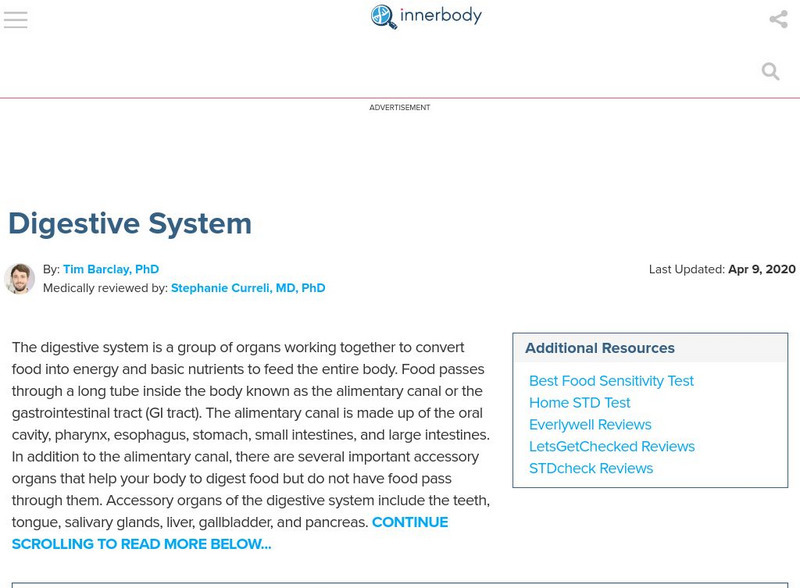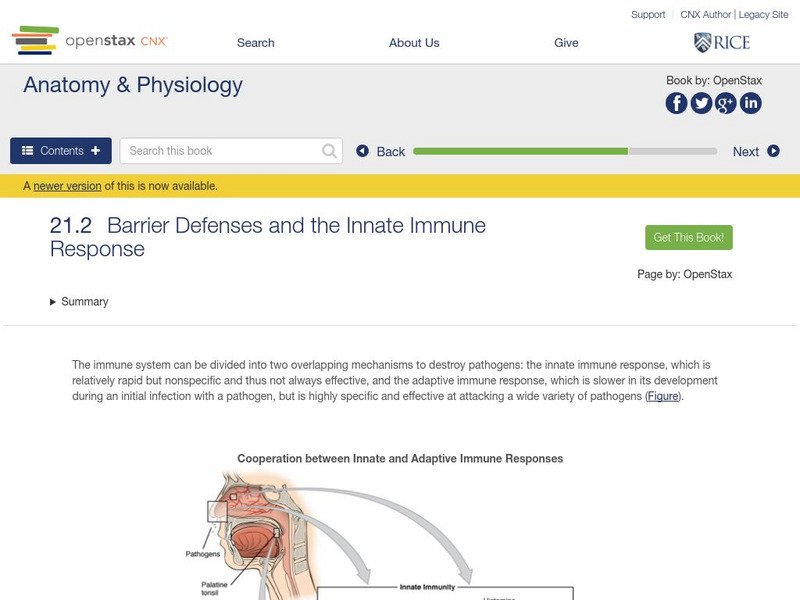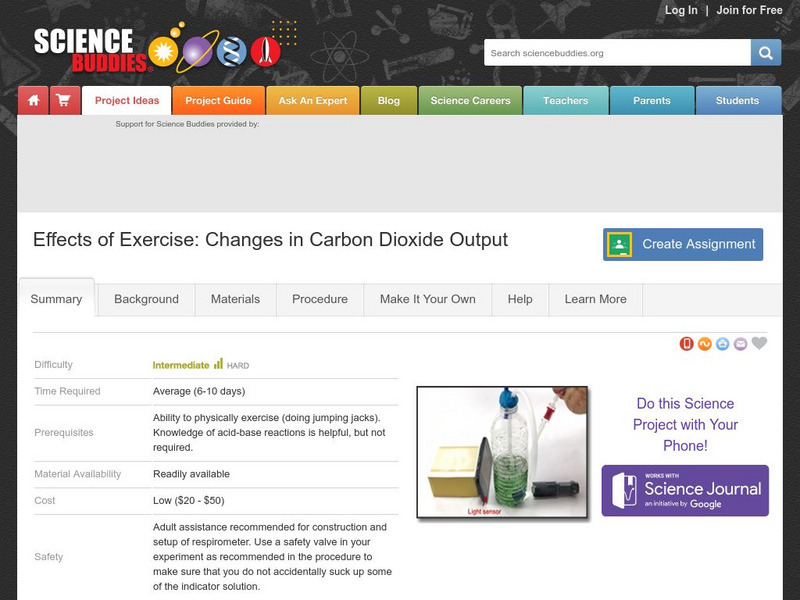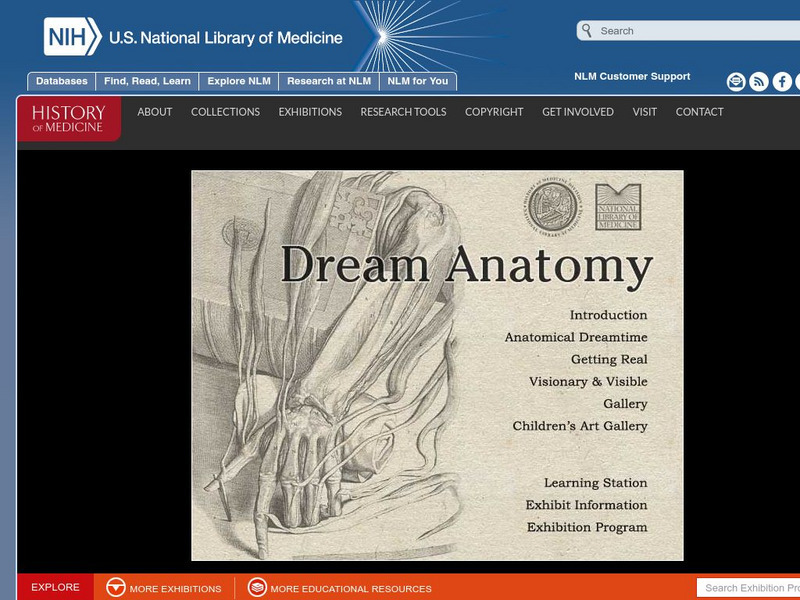Hi, what do you want to do?
Inner Body
Innerbody: Digestive System
Take a look inside the human body's digestive system. This site features diagrams of the digestive tract and each part is accompanied by labels and descriptions. Just select an organ by moving the mouse over its image.
Alabama Learning Exchange
Alex: New Town Health Club
Over the course of the year, the learners in Human Anatomy and Physiology will design a health club. As part of this year-long project, the students will develop a brochure or print advertisement for the health club. This project will...
OpenStax
Open Stax: Anatomy & Physiology: Barrier Defenses and Innate Immune Response
Students use this module to learn about the barrier defenses and the immune defense functions of the human body.
Other
Washington University: Hemoglobin and the Heme Group:
This site from the Department of Chemistry at the Washington University provides a deetailed study of the role of hemoglobin in blood physiology. The article is somewhat in-depth, complete with pictures, charts, and a bibliography.
Other
Get Body Smart: Histology Links
Designed for students and teacher of anatomy and physiology, GetBodySmart offers free tutorials and quizzes from a wide-variety of resources, including the nation's top researchers and universities.
TeachEngineering
Teach Engineering: Polluted Air = Polluted Lungs
To gain a better understanding of the roles and functions of components of the human respiratory system and our need for clean air, students construct model lungs that include a diaphragm and chest cavity. They see how air moving in and...
OpenStax
Open Stax: Anatomy & Physiology: Skeletal System Functions
This site helps you understand the human skeletal system, a body system composed of bones and cartilage that performs critical functions for the human body.
OpenStax
Open Stax: Anatomy & Physiology: The Peripheral Nervous System
Describe the structures found in the peripheral nervous system and the functions of those parts in the human body.
Science Buddies
Science Buddies: Effects of Exercise: Changes in Carbon Dioxide Output
Everybody knows that your body needs oxygen to keep going, and that you breathe out carbon dioxide as waste. What happens when you exercise? You've probably noticed that you breathe faster, and your heart beats faster. What triggers your...
Other
Biology Online: Human Physiology: Sensory Systems
Study the many parts of the human body that make up the sensory systems. Be able to identify receptors, primary sensory coding, neural pathways and more with this biology resource.
National Institutes of Health
National Library of Medicine: Dream Anatomy
Take a step back in time to see the human body and the field of medicine through the looking glass of history. Experience a different kind of representation of our internal anatomy, and learn about the history of human dissection.
OpenStax
Open Stax: Thoracic Cage
Learn here all about the thoracic cage, the part of the human anatomy that forms the thorax portion of the body.
Texas A&M University
Human Physiology in Space
Learn about some of the environmental challenges facing humans in space.
Other
Dr. Saul: Biology in Motion
This interactive site provides animations and activities in several areas of physiology. The images are simple, but clear. The accompanying text provides a good description of the process being shown.
TeachEngineering
Teach Engineering: Nerve Racking
This lesson describes the function and components of the human nervous system. It helps students understand the purpose of our brain, spinal cord, nerves and the five senses. How the nervous system is affected during spaceflight is also...
University of Utah
University of Utah: Cardiovascular Pathology Index
This site features a detailed index of photographs for cardiovascular pathology. You can see what a normal human heart looks like and what a sick one looks like too. Come and check it out.
TeachEngineering
Teach Engineering: Digestion Simulation
To reinforce students' understanding of the human digestion process, the functions of several stomach and small intestine fluids are analyzed, and the concept of simulation is introduced through a short, introductory demonstration of how...
TeachEngineering
Teach Engineering: Muscles, Oh My!
Students are introduced to how engineering closely relates to the field of biomechanics and how the muscular system produces human movement. They learn the importance of the muscular system in our daily lives, why it is important to be...
PBS
Pbs Learning Media: Amazing Heart Facts
This feature from the NOVA: "Cut to the Heart" highlights facts about the heart, including its size and placement, and will help you to understand the importance of this wondrous organ in our bodies.
TeachEngineering
Teach Engineering: Our Amazing Skeleton
This lesson covers the topic of human bones and joints. Students learn about the skeleton, the number of and types of bones in the body, and how outer space affects astronauts' bones. Students also learn how to take care of their bones...





















